PsychNewsDaily Publishers
100 Summit Drive
Burlington, MA, 01803
Telephone: (320) 349-2484
PsychNewsDaily Publishers
100 Summit Drive
Burlington, MA, 01803
Telephone: (320) 349-2484
Caring for a cat involves using natural remedies like coconut oil, pumpkin, and chamomile tea to support health, comfort, and wellness alongside regular veterinary care.
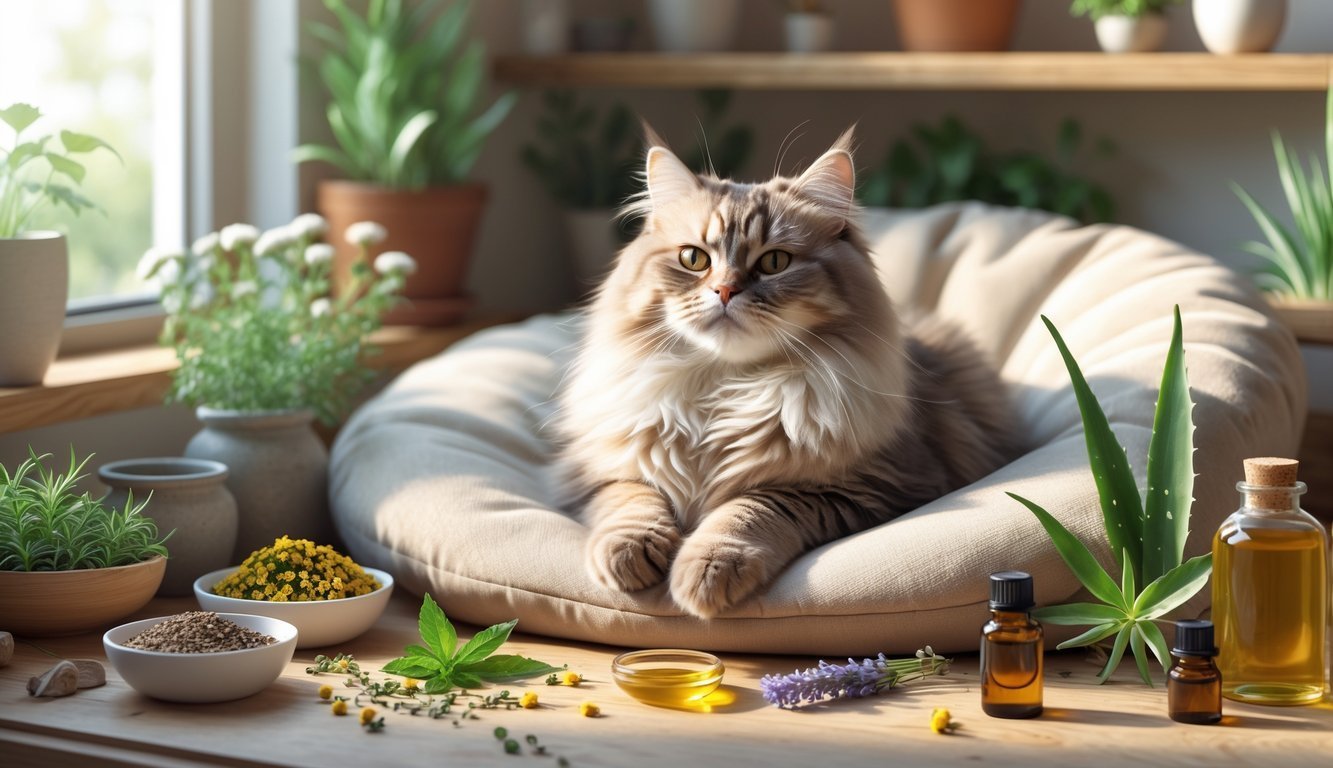
Caring for a cat means thinking beyond just food, water, and shelter. If you’re like most cat owners, you want simple, safe ways to support your feline’s health and comfort without always turning to medication.
Natural remedies can offer practical ways to handle everyday issues while keeping your cat feeling their best.
You’ll find gentle solutions here for things like skin irritation, digestion hiccups, or stress. These remedies work alongside regular vet care and help you feel more confident handling small problems at home.

Try coconut oil for your cat’s dry or itchy skin. It acts as a natural moisturizer, softening the skin and making the coat look shinier over time.
Start with a tiny amount. Rub a bit between your hands to warm it, then gently massage it onto the dry patches of your cat’s skin or fur.
Some cats might try to lick the oil, so keep an eye on them after you apply it. If needed, distract your cat with a toy or a treat until the oil sinks in.
Coconut oil also brings mild antimicrobial properties, which can help soothe minor irritation. Introduce it slowly and watch for any signs of sensitivity.
If your cat has ongoing skin trouble, check with your vet before making coconut oil a regular thing. You want to be sure it’s safe for your cat’s situation.

Plain pumpkin puree can support your cat’s digestion. It’s packed with fiber, which can help with both constipation and mild diarrhea.
Just make sure you use pure pumpkin, not pumpkin pie filling full of sugar and spices. A little goes a long way—most cats only need half a teaspoon to a teaspoon mixed into their food.
Pumpkin adds moisture and bulk to meals, which keeps stools regular and easier to pass. Some owners notice changes in a day or two.
If your cat keeps having stomach issues, check with your vet. Pumpkin helps with mild problems, but it’s not a substitute for medical care.
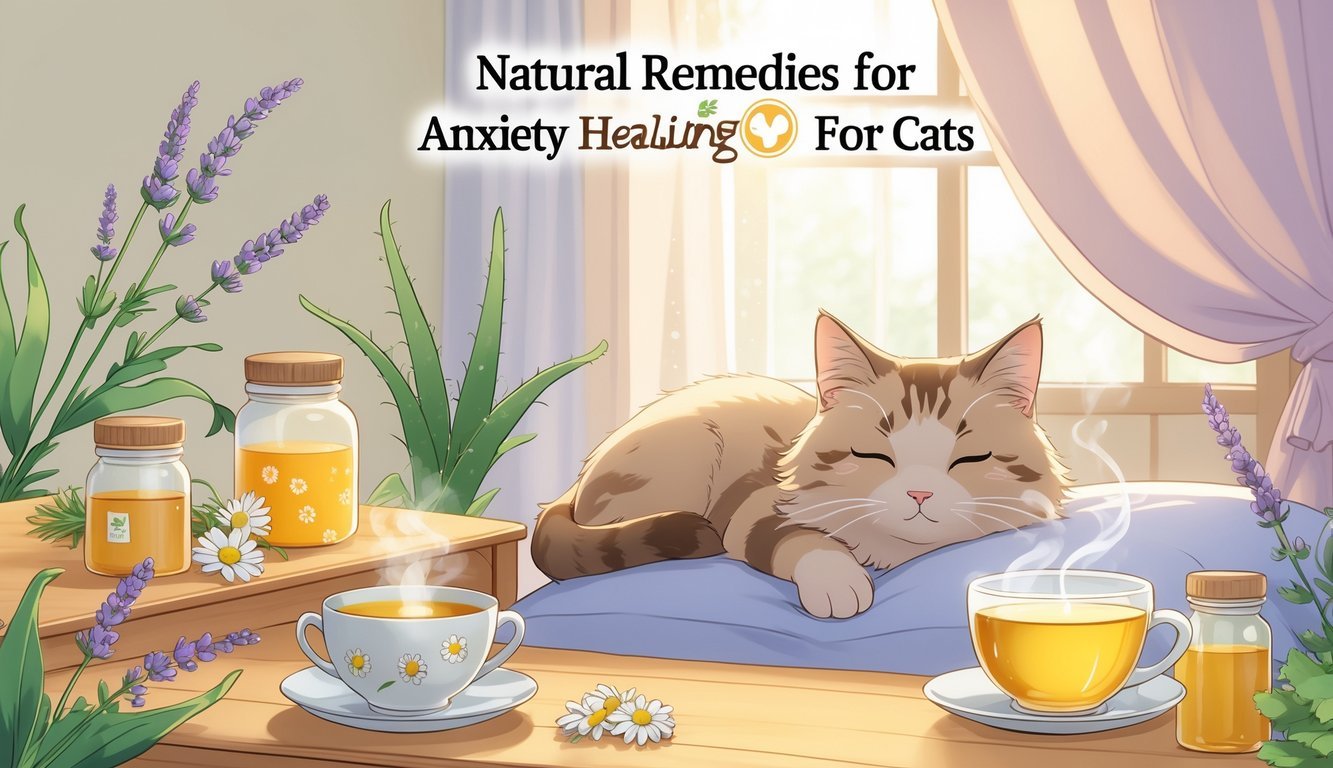
Chamomile tea can gently help your cat relax. Many pet owners reach for it when their cats seem stressed—like hiding, pacing, or meowing too much.
Chamomile brings mild calming effects and can also help with minor stomach upset. Always use plain, caffeine-free tea.
Don’t let your cat nibble raw chamomile plants, since some parts aren’t safe. Instead, brew a weak tea, let it cool, and add a small amount to food or water.
Talk with your vet before trying chamomile tea. Every cat is different, and your vet can help you figure out what’s safe.

Aloe vera gel can soothe small cuts or scratches on your cat. The gel feels cool and calming, which may reduce irritation and support healing.
Before you apply it, gently clean the wound with mild soap and warm water. Dry the area with a soft towel so the gel sticks better.
Pick pure aloe vera gel without fragrances, alcohol, or dyes. Those extras can irritate your cat’s skin.
Spread a thin layer of gel on the wound. Repeat once or twice a day, but check the area for any signs of infection.
If your cat licks the spot, try a light bandage to keep them from swallowing the gel and to keep the wound clean.
For deep cuts, heavy bleeding, or infection, call your vet right away. Aloe vera is best for minor wounds, not serious injuries.
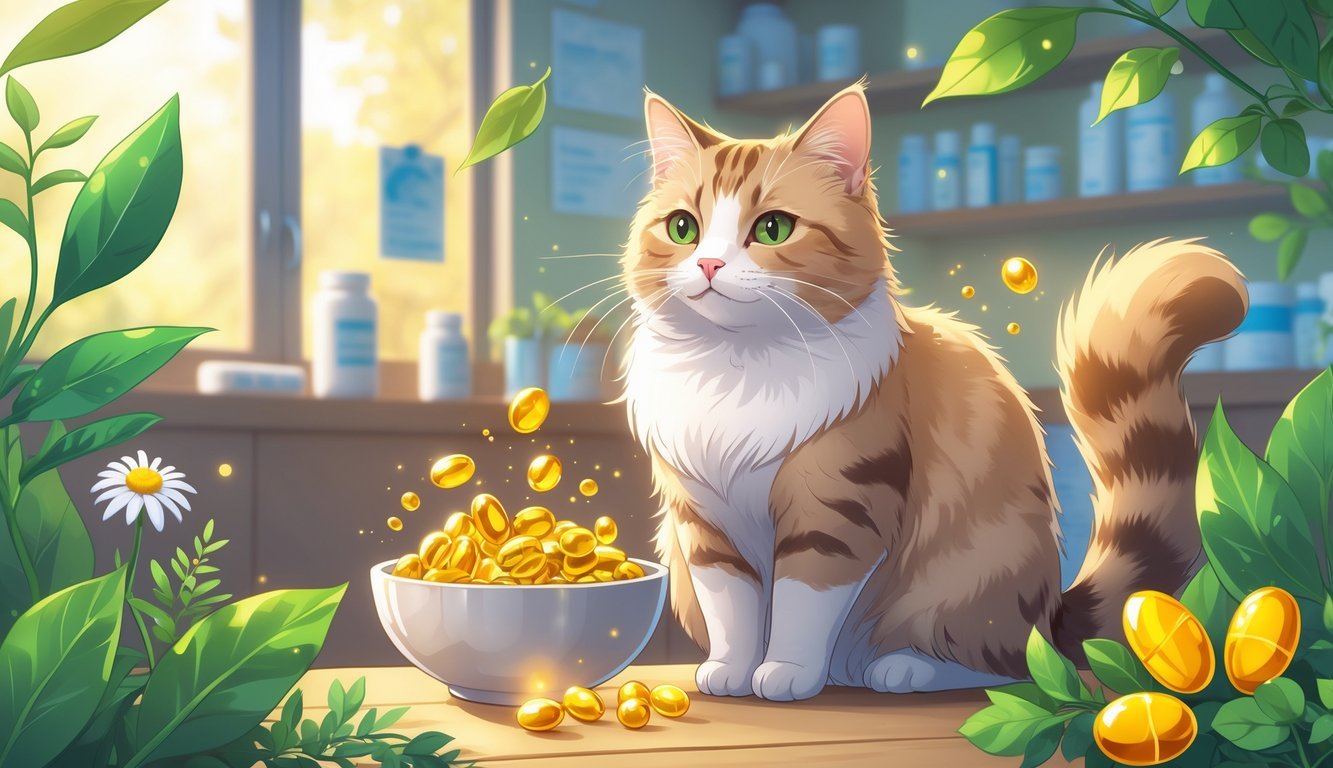
Fish oil supports your cat’s joints with omega-3 fatty acids. These healthy fats help lower inflammation, which often makes arthritis or stiffness worse.
When you add fish oil to your cat’s food, you might notice easier movement and less discomfort during play. It can help with mobility as your cat ages.
Start with small amounts and always check with your vet first. You want to make sure the dosage is safe for your cat.
Pick high-quality fish oil made for pets, since that avoids unnecessary additives. It’s easier for cats to digest and less likely to cause side effects.
Some cats react to fish-based products, so watch for changes like stomach upset or itching. If you spot problems, stop the supplement and ask your vet.

Slippery elm bark can calm your cat’s throat when it feels irritated. The inner bark turns into a soothing gel that coats the throat and eases dryness.
Mix slippery elm powder with water to make a smooth liquid. Add a tiny amount to your cat’s food, or use a syringe if your vet says it’s okay.
People have used this herb for centuries to help with digestion and throat comfort. For cats, it’s especially nice during mild coughing or irritation.
Choose pure, high-quality powder or capsules without additives. Ask your vet about the right amount before giving it to your cat.
Slippery elm is gentle, but it can affect how some medicines work. Give it at a different time than other treatments.

Calendula cream can soothe your cat’s minor skin issues. This natural remedy comes from the calendula plant, which people have used for years to calm irritation and help healing.
If your cat has small scratches, redness, or mild itching, calendula cream may ease discomfort. Its gentle anti-inflammatory and antimicrobial effects make it a safe pick for many cats when used right.
Always apply a thin layer to the area, and avoid open wounds or broken skin. Wash your hands after applying it.
If your cat’s skin problem doesn’t get better or gets worse, call your vet. Calendula cream is handy for mild cases, but not a replacement for professional care.

Probiotics can help balance your cat’s digestive system. These friendly bacteria support healthy gut flora, which plays a big role in digestion and nutrient absorption.
When your cat’s gut stays balanced, you might notice fewer issues like loose stools or gas. Probiotics can also help during stress, diet changes, or after antibiotics.
You’ll find probiotics for cats as powders, capsules, or chews. Mixing them with wet food or broth often works best.
Natural options like pumpkin or goat milk can act as gentle prebiotics, feeding the good bacteria in the gut. Introduce new foods slowly to avoid stomach upset.
Don’t give your cat human probiotics—the strains might not be safe or helpful. Stick to products made for cats.
Before starting any probiotic, check with your vet to make sure it’s the right choice. That way, you pick a safe product and the right dose.

A little honey can help soothe your cat’s throat if they have a mild cough. Honey has natural soothing properties that may ease irritation and make swallowing easier.
For a dry or tickly cough, try a drop of honey mixed with warm water. Always use just a tiny bit—too much sugar isn’t good for cats.
Honey may also support your cat’s immune system, thanks to natural antioxidants. Still, it’s not a replacement for a vet visit if the cough sticks around or gets worse.
Use only plain, raw honey without added flavors or sweeteners. Don’t give honey to kittens under one year old, since their digestive systems are more sensitive.
Before trying honey or any home remedy, check with your vet to make sure it’s safe for your cat’s situation.
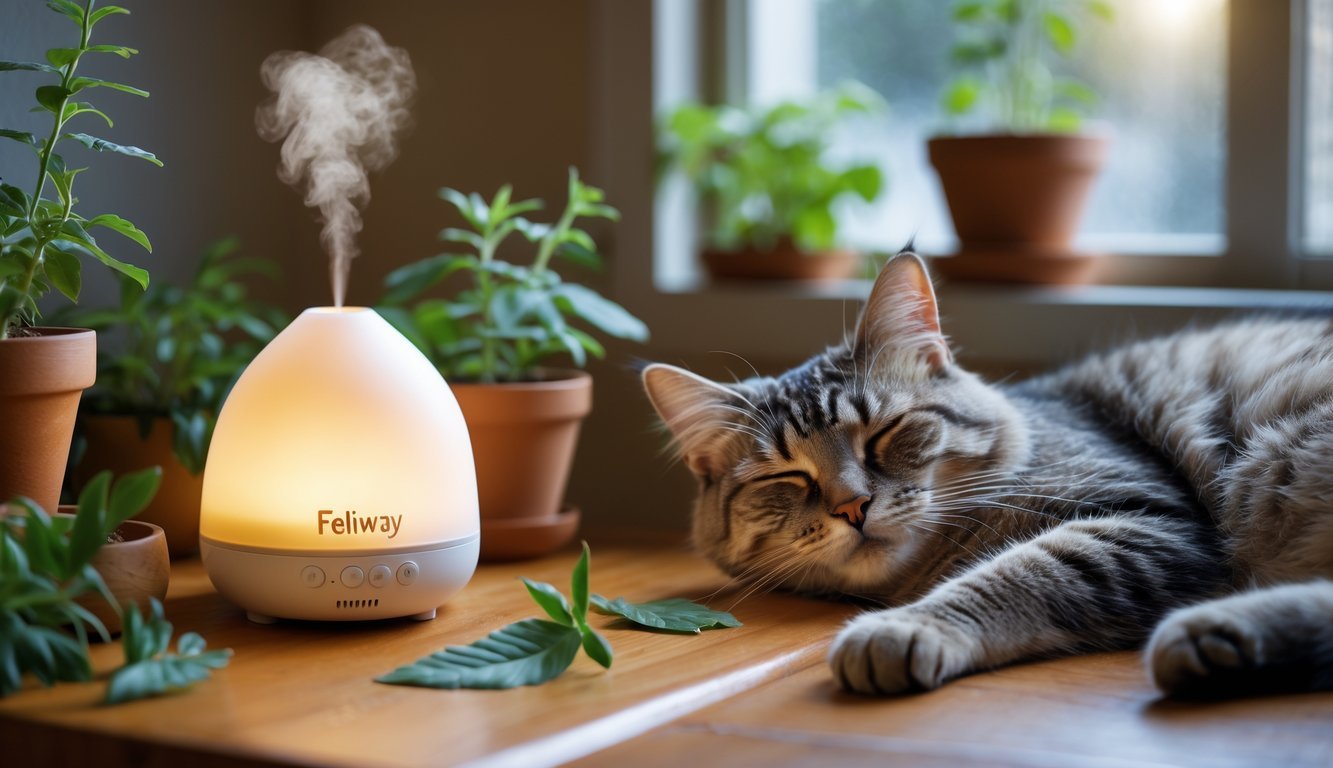
If your cat acts tense, hides more, or scratches where they shouldn’t, stress might be the reason. A Feliway diffuser can help by releasing synthetic pheromones that mimic the ones cats naturally make.
When you plug in the diffuser, it spreads these pheromones through the air. This can help your cat feel more secure and less likely to show stress behaviors like spraying or over-grooming.
Many vets recommend Feliway for cats dealing with new environments, new pets, or changes at home. It’s drug-free and won’t make your cat sleepy.
Use the diffuser in the room where your cat spends most of their time. Each refill usually lasts about a month, so it’s easy to keep a steady calming effect.
If your cat has trouble with stress, adding a Feliway diffuser might give them some extra comfort.

Natural remedies use herbs, supplements, and lifestyle changes to support your cat’s health. They can help with things like skin irritation, mild tummy upsets, or stress without relying only on synthetic drugs.
Still, you need to understand how these remedies really work—and be careful about common myths.
Natural remedies use ingredients like herbs, essential fatty acids, probiotics, and calming plants. These ingredients support your cat’s body instead of just covering up symptoms.
Chamomile, for example, can ease mild anxiety. Pumpkin might help with digestion.
Think of these remedies as gentle tools that boost your cat’s natural defenses. They can reduce inflammation, help your cat absorb nutrients, or balance gut bacteria.
Most medications focus on quick relief, but natural remedies usually try to restore balance. That’s one thing I appreciate about them.
You can also use some remedies alongside veterinary treatments. For example:
If you use these options correctly, they can make your cat more comfortable and support long-term wellness.
People sometimes assume that natural always means safe. But that’s not true. Some plants, like garlic or onions, are actually toxic to cats.
Even safe herbs can cause trouble if you give the wrong amount. It’s always smart to check with a vet before trying something new.
Another myth? That natural remedies can replace your vet. They’re helpful for mild or ongoing issues, but serious things like infections or injuries need professional care.
Some folks expect results overnight. Honestly, natural remedies tend to work slowly. For example, omega-3s for joint support might need a few weeks before you notice a difference.
Patience and consistency really matter here.
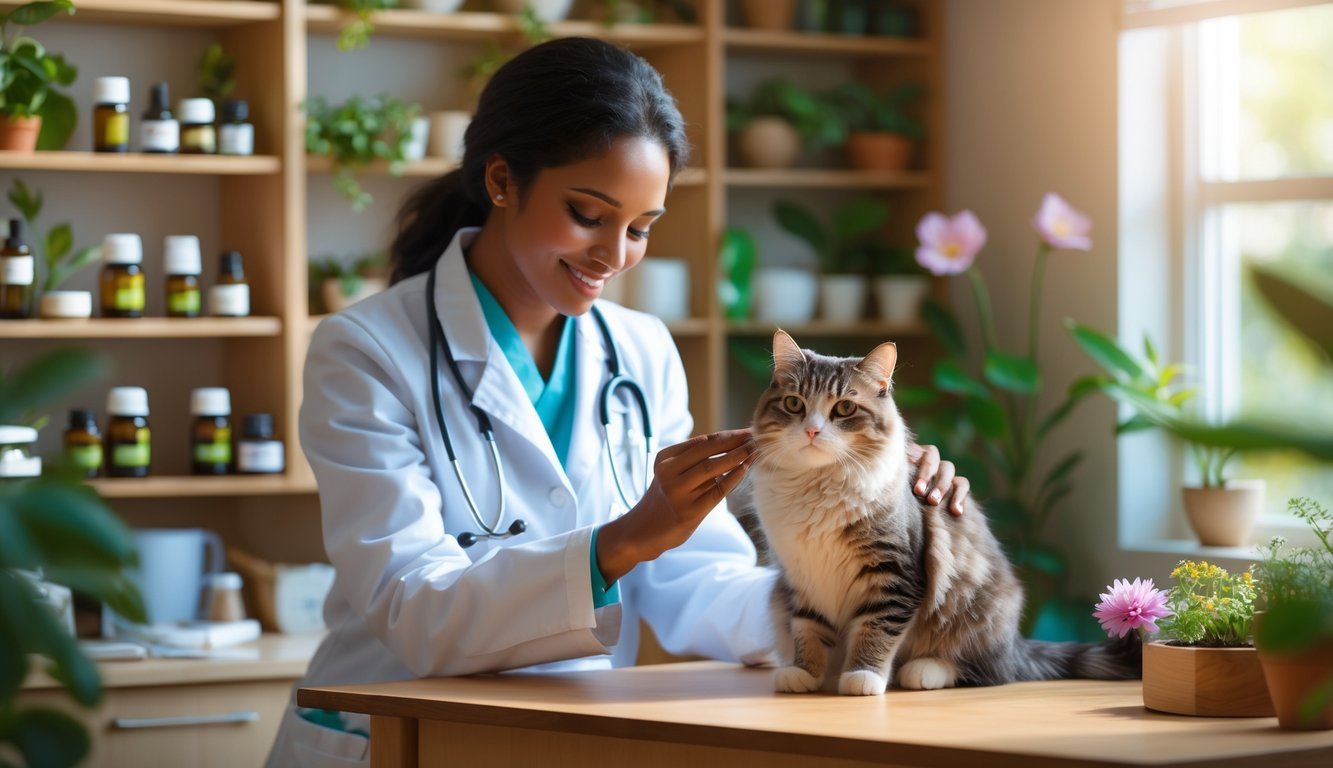
Natural remedies can support your cat’s health, but they don’t replace professional care. Some conditions need medical attention right away.
Often, your cat will benefit most from a mix of natural and conventional treatments.
Call your vet if you notice sudden or severe changes in your cat’s behavior, appetite, or energy. If your cat refuses food for more than a day, keeps vomiting, or has ongoing diarrhea, that’s a big warning sign.
Trouble breathing, straining to pee, or blood in the stool or urine all need urgent care.
Don’t ignore subtle changes, either. Weight loss without a diet change, hiding more, or less grooming can all point to illness.
Cats are sneaky about pain, so those small changes really matter.
Here’s a quick list of symptoms you should never ignore:
If you spot any of these, skip the home care and call your vet right away.
You can often turn to natural remedies for mild issues like stress, minor digestive problems, or skin irritation. For instance, a bit of pumpkin might help ease constipation, and calming herbs sometimes take the edge off anxiety.
These approaches usually stay safe when you use them carefully and with some guidance. It’s a good idea to check with your vet, especially if your cat already takes medication—herbs and supplements can sometimes clash with prescriptions.
I’d honestly think of natural remedies as supportive care, not a cure. They might reduce symptoms, make your cat more comfortable, or even boost overall wellness.
Still, when it comes to infections, chronic disease, or serious injury, you really need conventional medicine. Blending both approaches lets you give your cat the safest and most complete care you can.